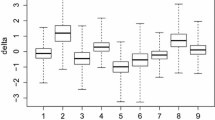Abstract
Although conventional tests are often used for determining a student’s overall competence, they are seldom used for determining a fine-grained model. However, this problem does arise occasionally, such as when a conventional test is used to initialize the student model of an ITS. Existing psychometric techniques for solving this problem are intractable. Straight-forward Bayesian techniques are also inapplicable because they depend too strongly on the priors, which are often not available. Our solution is to base the assessment on the difference between the prior and posterior probabilities. If the test data raise the posterior probability of mastery of a piece of knowledge even slightly above its prior probability, then that is interpreted as evidence that the student has mastered that piece of knowledge. Evaluation of this technique with artificial students indicates that it can deliver highly accurate assessments.
Access this chapter
Tax calculation will be finalised at checkout
Purchases are for personal use only
Preview
Unable to display preview. Download preview PDF.
Similar content being viewed by others
References
Conati, C., Gertner, A., VanLehn, K. & Druzdzel, M. (1997). On-line student modeling for coached problem solving using Bayesian networks. In A. Jameson, C. Paris & C. Tasso, User Modeling: Proceedings of the Sixth International conference, UM97. New York: Springer Wein.
DiBello, L. V., Stout, W.F. & Roussos, L. A. (1995) Unified cognitive/psychometric diagnostic assessment likelihood-based classification techniques. In P. D. Nichols, S. F. Chipman & R. L. Brennan (Eds.) Cognitively Diagnostic Assessment. Hillsdale, NJ: Erlbaum.
Neopolitan, R. E. (1990). Probabilistic Reasoning in Expert Systems: Theory and Algorithms. New York: Wiley.
Pearl, J. (1988). Probabilistic Reasoning in Intelligent Systems: Networks of Plausible Inference. San Mateo, CA: Morgan-Kaufman.
Samejima, F. (1995). A cognitive diagnosis method using latent trait models: Competency space approach and its relationship with DiBello and Stout’s unified cognitive-psychometric diagnosis model. In P. D. Nichols, S. F. Chipman & R. L. Brennan (Eds.) Cognitively Diagnostic Assessment. Hillsdale, NJ: Erlbaum.
Tatsuoka, K. K. (1990). Toward an integration of item-response theory and cognitive error diagnoses. In N. Fredericksen, R. L. Glaser, A. M. Lesgold & M. G. Shafto (Eds), Diagnostic Monitoring of Skill and Knowledge Acquisition. Hillsdale, NJ: Erlbaum.
Tatsuoka, K. K. (1995). Architecture of knowledge structures and cognitive diagnosis: A statistical pattern recognition and classification approach. In P. D. Nichols, S. F. Chipman & R. L. Brennan (Eds.) Cognitively Diagnostic Assessment. Hillsdale, NJ: Erlbaum.
VanLehn, K. (1996). Conceptual and meta learning during coached problem solving. In C. Frasson, G. Gauthier and A. Lesgold (Eds.) ITS96: Proceeding of the Third International Conference on Intelligent Tutoring Systems. New York: Springer-Verlag.
Author information
Authors and Affiliations
Editor information
Editors and Affiliations
Rights and permissions
Copyright information
© 1998 Springer-Verlag Berlin Heidelberg
About this paper
Cite this paper
VanLehn, K., Niu, Z., Siler, S., Gertner, A.S. (1998). Student Modeling from Conventional Test Data: A Bayesian Approach without Priors. In: Goettl, B.P., Halff, H.M., Redfield, C.L., Shute, V.J. (eds) Intelligent Tutoring Systems. ITS 1998. Lecture Notes in Computer Science, vol 1452. Springer, Berlin, Heidelberg. https://doi.org/10.1007/3-540-68716-5_49
Download citation
DOI: https://doi.org/10.1007/3-540-68716-5_49
Published:
Publisher Name: Springer, Berlin, Heidelberg
Print ISBN: 978-3-540-64770-6
Online ISBN: 978-3-540-68716-0
eBook Packages: Springer Book Archive




